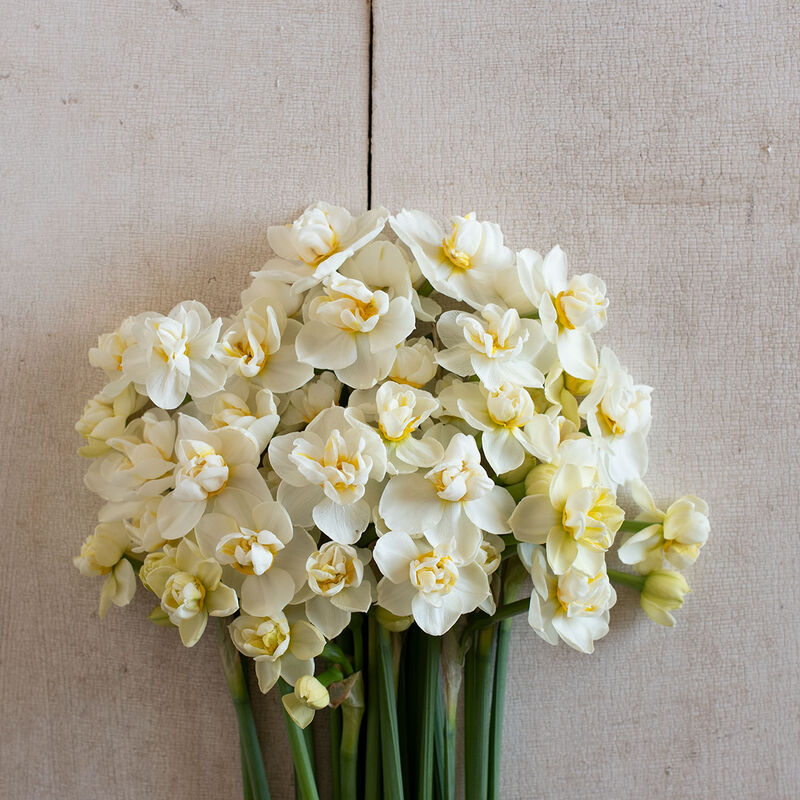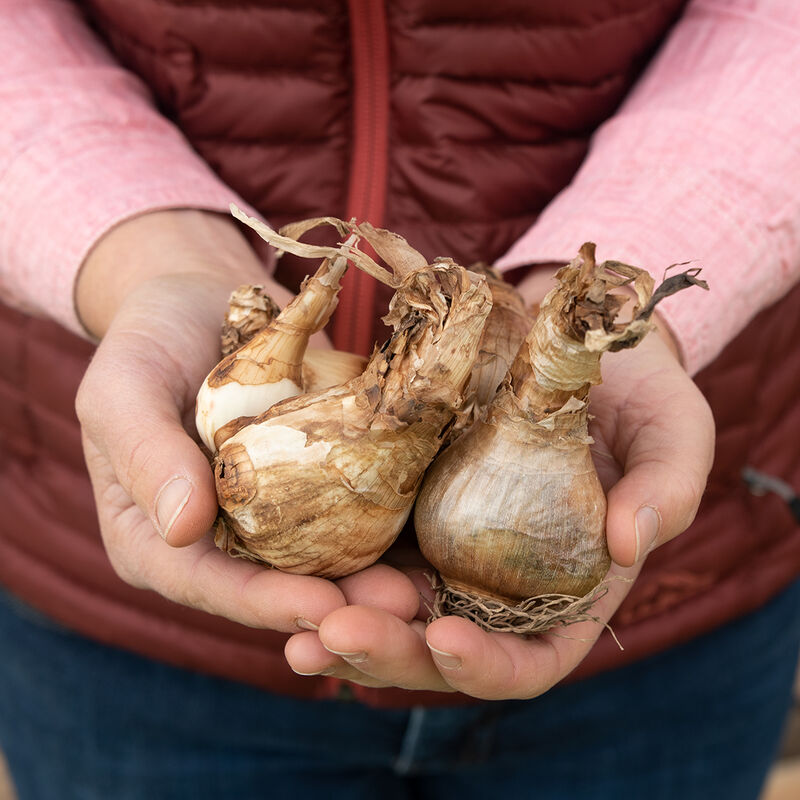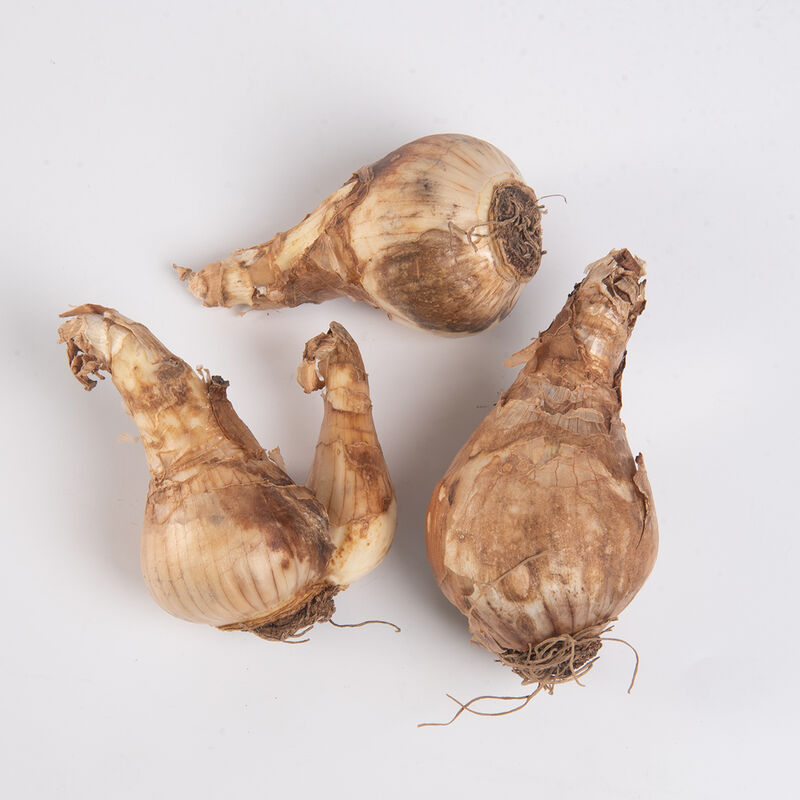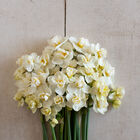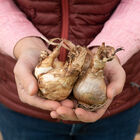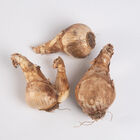Cheerfulness Narcissus Bulb
Cheerfulness Narcissus Bulb
Sweet look and scent.
Creamy white petals flecked with gold. Clusters of 1 1/2–1 3/4" double blooms are reminiscent of small meringue cookies. Produces 2–3 flowers per stem. Heavily fragrant with notes of honey and vanilla. Blooms mid-May in our outdoor trials. Cheerfulness is an introduction from the 1920s. NOTE: Bulbs do not come pre-chilled; if growing in hardiness Zones 9–10, see growing information (below) for pre-chilling instructions.Specs:
- This product does not ship to Canada.
- This product does not ship to the following countries: United Arab Emirates, Austria, Australia, Barbados, Belgium, Bulgaria, Bermuda, Bahamas, Switzerland, Cyprus, Czech Republic, Germany, Denmark, Estonia, Spain, Finland, France, United Kingdom, Greece, Hong Kong, Croatia, Hungary, Ireland, Iceland, Italy, Japan, Republic of Korea, Kuwait, Cayman Islands, Lithuania, Luxembourg, Latvia, Malta, Netherlands, Norway, New Zealand, Oman, Poland, Portugal, Qatar, Romania, Saudi Arabia, Sweden, Singapore, Slovenia, Slovakia, San Marino, Thailand, Trinidad and Tobago, Taiwan, Ukraine.
- This product does not ship to the following states and jurisdictions: AA, AE, AP, AS, FM, GU, HI, MH, MP, PR, PW, VI.
This item’s size, weight, or shape may require an additional shipping surcharge based on the shipping location selected. Specific charges will be displayed during checkout.
Flower bulbs ship October through November.
DAYS TO GERMINATION:
Plant bulbs in fall for spring blooms.SOWING:
If you cannot plant the bulbs right away, you can store them for up to a month by following these steps. Open all bags and boxes, and place bulbs in a cool, dark, dry area (such as a root cellar, basement, or garage) with good air circulation. You can also store your bulbs in the refrigerator crisper drawer, but do not store them with ripening fruits; ethylene gas released by ripening apples and other fruits can cause the flower inside the bulb to abort or incompletely form. Temperatures of 38–65°F (3–18°C) are fine. The cooler the better, but do not freeze your bulbs. Bulbs should be planted soon after arrival (or immediately after prechilling as described below) and when the soil has cooled to 55°F (13°C) or cooler, and nighttime temperatures consistently drop to 40–50°F (4–10°C), but before the ground freezes. Planting about 5–6 weeks before the ground freezes allows the bulbs sufficient time to develop roots. Note in Hardiness Zones 9–10: Chilling during the bulb's dormant period is required for flower development. Johnny's does not currently offer prechilled bulbs. If you are in Zones 9–10 you will need to prechill your bulbs at 38–45°F (3–7°C), for about 16-18 weeks, before planting. To prechill, leave bulbs in their bags and place in a refrigerator. Bulbs can be refrigerated for longer than the recommended period but not for a shorter period. Be careful not to store bulbs near fruit, especially apples. Once bulbs have been chilled, plant them immediately, at the coolest time of the year. In Zones 9–10, because chilling does not naturally occur, bulbs will only bloom once, in the spring following planting of prechilled bulbs. Planting Bulbs: Loosen the soil to a depth of 8–12" to help ensure adequate root establishment. Adding a layer of compost to the root zone at planting will also aid in root establishment and plant growth. Keep soil moist, but not saturated. Press bulbs, upright, into the prepared soil (with the pointed end up and the fatter, flat end down). Cover bulbs with soil 2½–3 times deeper than the bulb height; deeper in locations with light soil. For example; a 1½" tall bulb should be covered with 4–5" of soil. As a rule of thumb; planting a bit too deep is better than planting too shallow. Planting each bulb at the same depth will help ensure that they all bloom at the same time. Water immediately after planting. Continue to water regularly, keeping the soil moist but not soggy until the ground freezes.LIGHT PREFERENCE:
Sun/Part Shade Sun or partial sun. Narcissus tolerate part shade, especially during hot weather. Plants require at least 5–6 hours of sun per day at the time of bloom.PLANT HEIGHT:
Varies by variety.PLANT SPACING:
1–6" apart. Wider spacing allows room for bulbs to multiply. Do not break apart bulb clumps that have smaller bulbs attached at the base. Plant them as an intact cluster.HARDINESS ZONES:
See individual varieties.VASE LIFE:
4–6 days. The sap of daffodils can be toxic to other types of flowers. If you plan to use them in a mixed arrangement, allow the daffodils to sit in their own water for 12–24 hours before combining them with other flowers.STORAGE TEMPERATURE:
32-35°F (0-2°C) optimal storage temperature.HARVEST:
To get a long stem and reduce the amount of sap released, harvest by reaching to the base of the stem and pulling gently. Avoid taking leaves when harvesting flowers; the plants need the leaves to manufacture energy for next year's blooms. Continue to irrigate plants even after the bloom period to ensure development of the bulbs for next year's flowers. Deadhead any blooms you do not harvest. Wait until the plant leaves have turned brown before mowing over.SOIL REQUIREMENTS:
Bulbs require a well-drained soil with pH 6.0–7.0. Amend the soil according to soil test results and as necessary to adjust the pH and optimize drainage. Planting in raised beds or the addition of compost can improve drainage. Avoid excess nitrogen and fresh manure.NOTES: Irrigate plantings regularly during dry spells, even after plants have stopped blooming; the plants need water to form the bulbs that will create next year's flowers. Well-maintained plantings of daffodil bulbs should remain productive year after year. Daffodil bulbs multiply; in time one bulb will become a clump of bulbs. Dig up and divide the clumps of bulbs every 4–5 years. The best time to dig the bulbs is after the plants have fully died back, in late summer. Replant bulbs immediately.Scientific Name:
Narcissus spp.
Alternate Common Names:
Daffodil, daffadowndilly, Narcissus, jonquil.
Johnny's is committed to your success, every step of the way.
We want you, our customer, to be 100% satisfied with all of our seeds, tools, and supplies.
If anything you purchase from us proves unsatisfactory, we will either replace the item or refund the purchase price.


